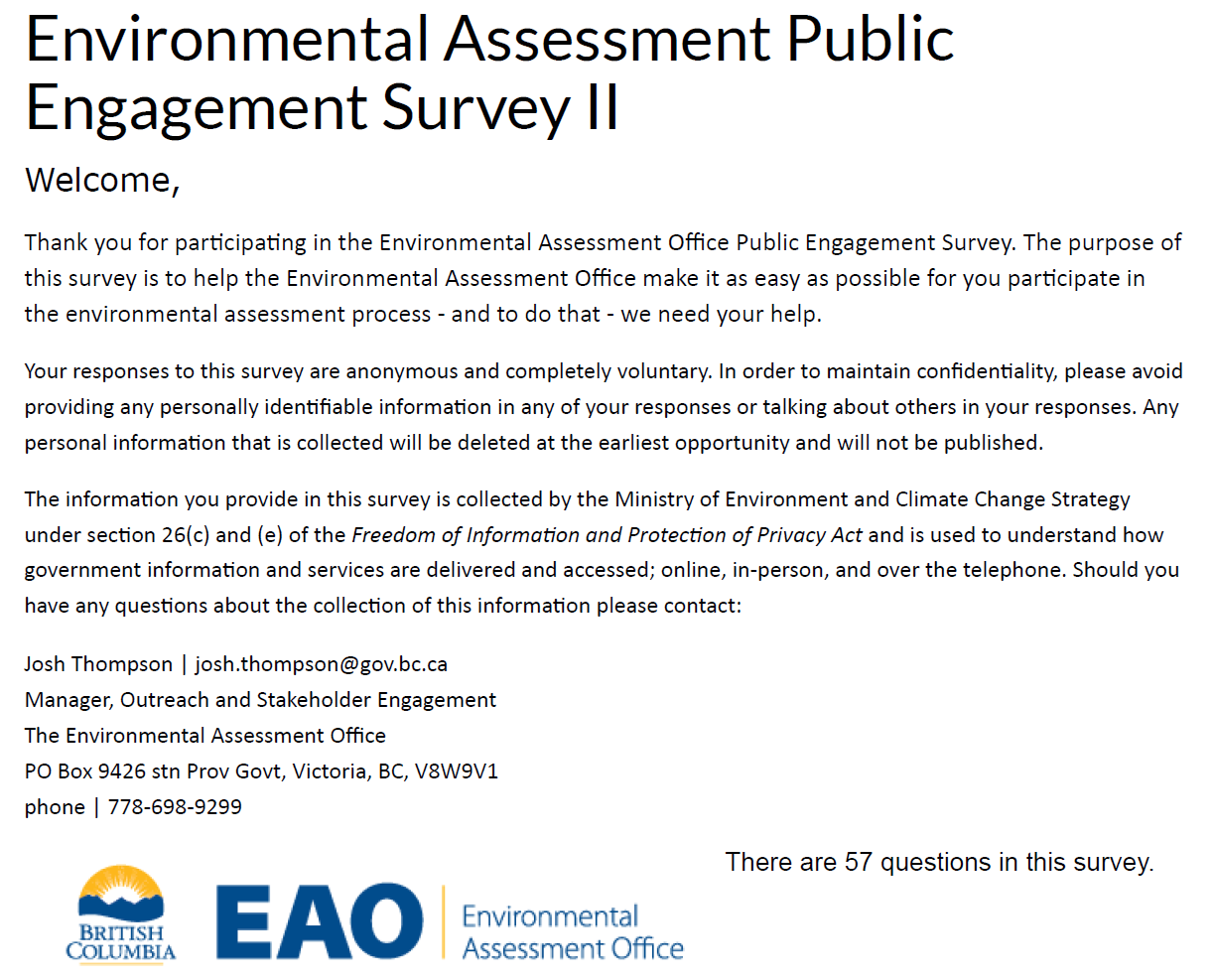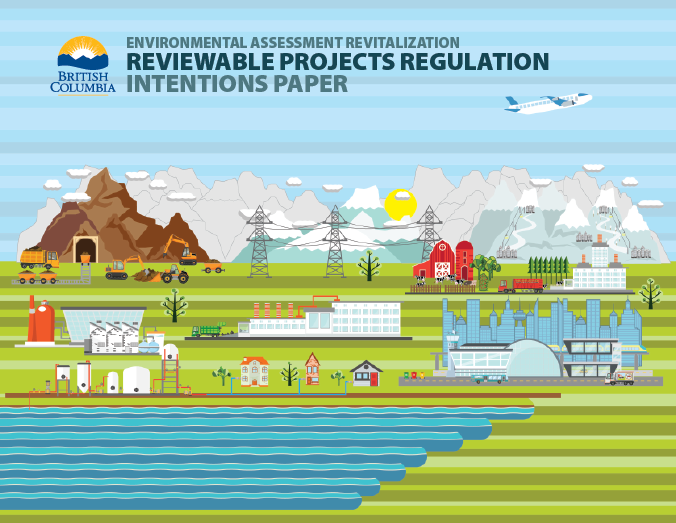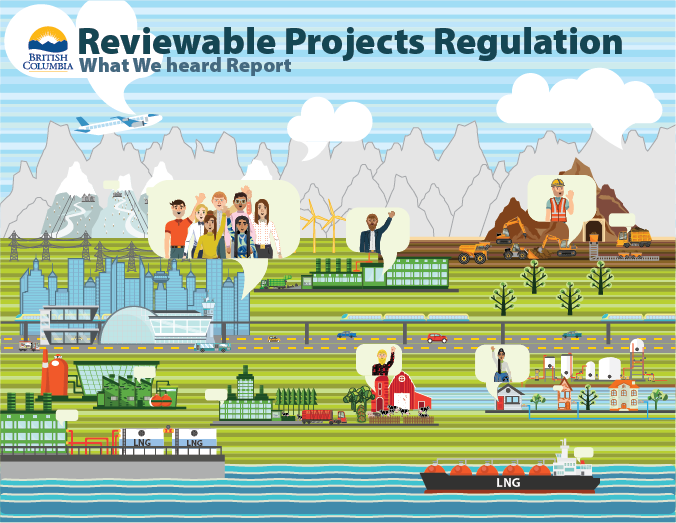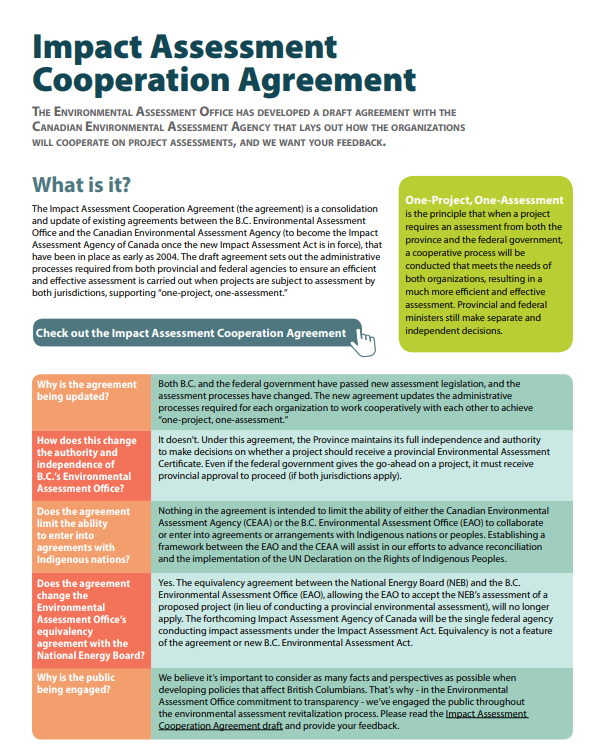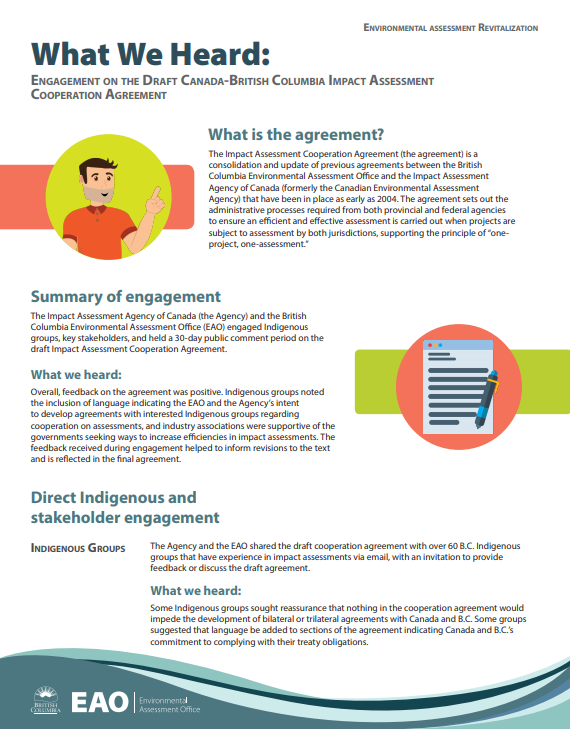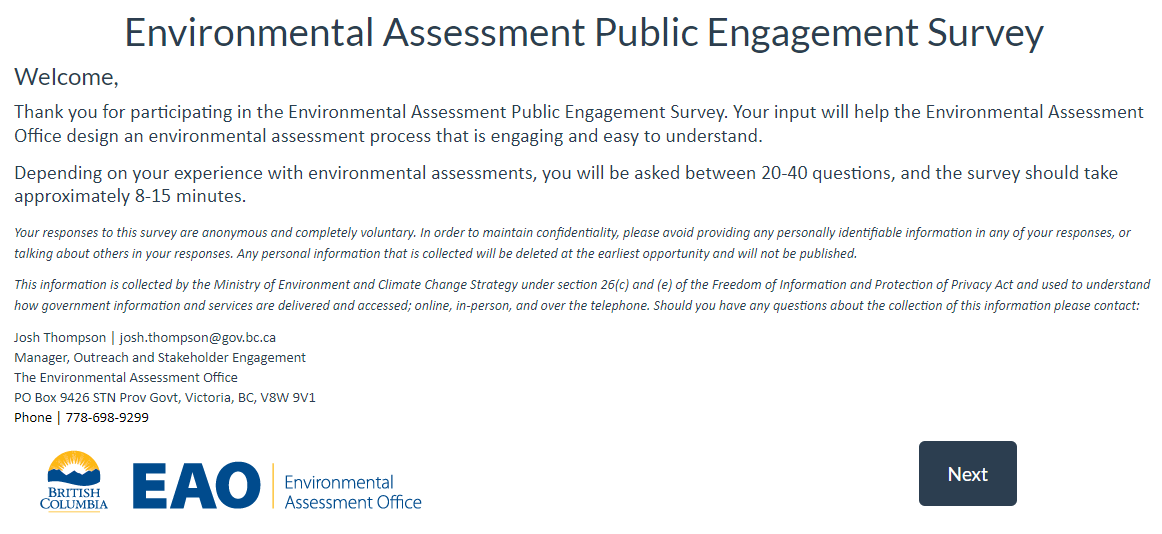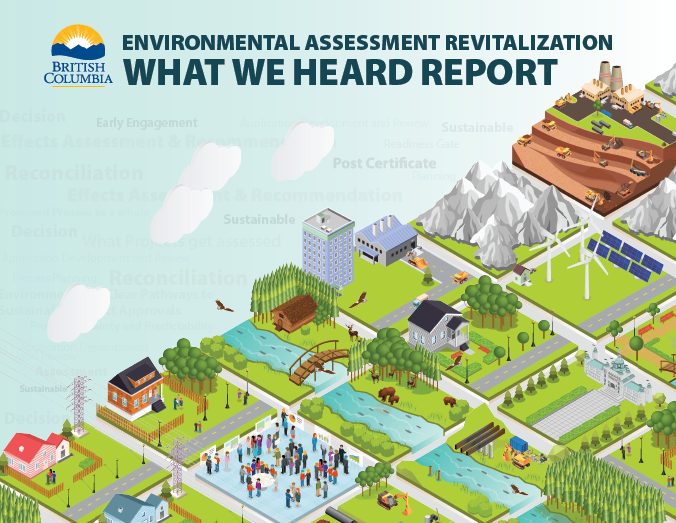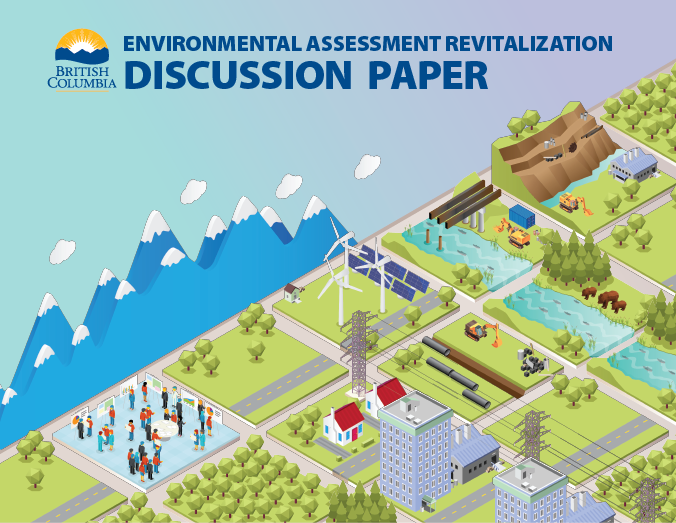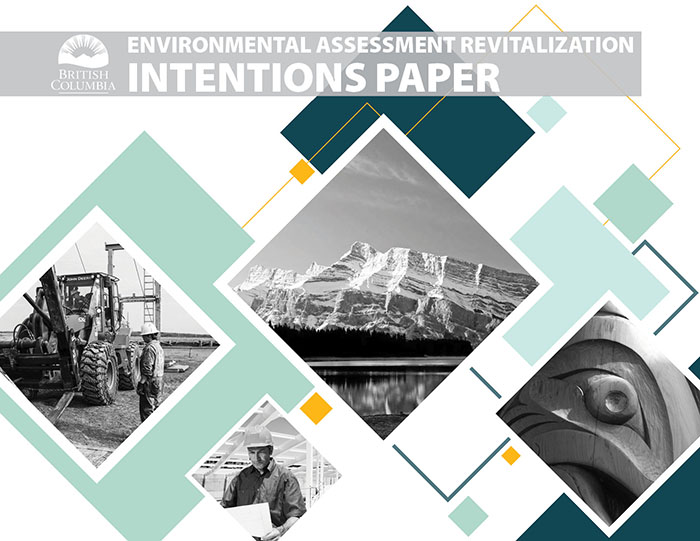Engagement on Environmental Assessment Revitalization
The Environmental Assessment Office engaged extensively with all Environmental Assessment participants throughout the development of the Act, and supporting regulations and policies. This engagement continues on a number of regulations and policies still in development.
Public & Stakeholder Engagement
| Engagement | Date | What We Heard | Outcome |
|---|---|---|---|
|
Public Engagement Survey II Following up on the data collected in the previous survey, the information collected in this survey helped the EAO refine it's approach to public engagement. |
September 6th -October 15th, 2019 | 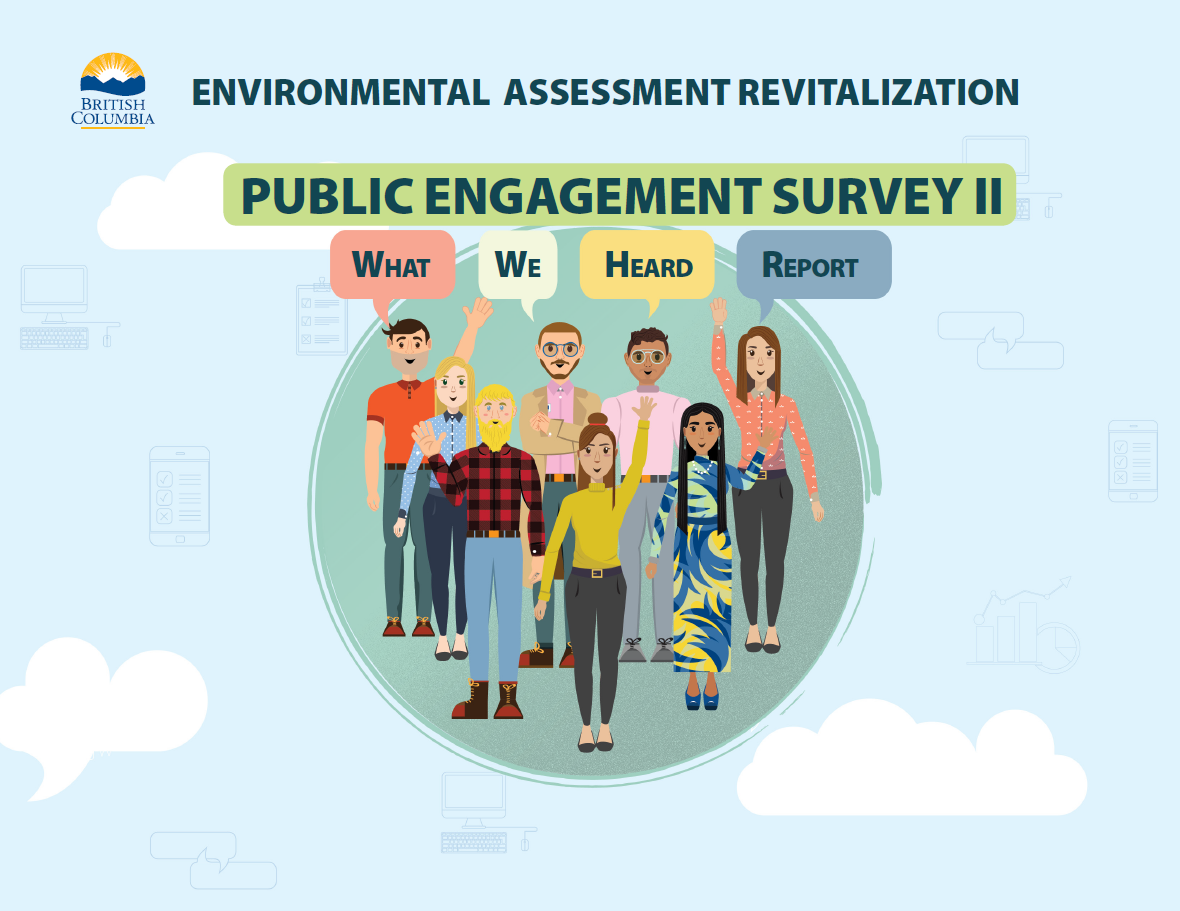 180 public responses are summarized in a What We Heard Report 180 public responses are summarized in a What We Heard Report |
The feedback provided helps inform the kind of resources, tools, and communication channels we use to make participating in environmental assessments as easy as possible. |
|
Reviewable Projects Regulation Intentions Paper The Reviewable Projects Regulation sets out what projects automatically receive an environmental assessment. The Intentions paper outlines proposed changes to the regulation associated with the new Act and was developed to support engagement on the topic. |
September 6th - October 7th, 2019 |
|
The Feedback received informed the development of the final Reviewable Projects Regulation |
|
Impact Assessment Cooperation Agreement The EAO engaged the public, stakeholders and Indigenous nations on the Impact Assessment Cooperation Agreement - a consolidation and update of existing agreements between the B.C. Environmental Assessment Office and the Canadian Environmental Assessment Agency that sets out the administrative processes required from both provincial and federal agencies to ensure efficient and effective Environmental Assessments. |
July 8th - August 7th, 2019 |
Feedback from the public, stakeholders and Indigenous nations was summarized in a What We heard Report. |
The feedback received informed the development of the final agreement. |
|
Direct Engagements on the development of policies and regulations The EAO held meetings with stakeholders, including industry, environmental groups, industry associations, local governments and environmental assessment practitioners on the development of policies and regulations to support the new Act. |
February 2019 - November 2019 | Meetings took place on a variety of policies and regulations, and so there is no overarching What We Heard Report on direct engagements for the purposes of regulation and policy development | Feedback informed the development of policies and regulations over the course of their development. |
|
Direct Engagements on the development of the Act The EAO held meetings with Indigenous groups and stakeholders, including industry, environmental groups, industry associations, local governments and environmental assessment practitioners on the development of the Act. A list of the meetings and the material discussed is available, here. |
February 20th - August 16th, 2018 | A summary of all direct engagements conducted on the development of the Act is available here | The feedback gathered informed the development of the Act. |
|
Public Engagement Survey It’s important to us that British Columbians understand the environmental assessment process, and that it’s easy to meaningfully engage throughout the process. This means information is easy to find, easy to understand, and that the Environmental Assessment Office makes information available in a way that works for all British Columbians. The survey provides valuable information to help us achieve these goals. |
June 18th-July 30th, 2018 |
Over 550 responses, summarized in a What We Heard Report |
The survey data informed the development of a new draft Public Engagement Policy |
|
Environmental Assessment Act Discussion Paper An outline of proposed changes to B.C.'s Environmental Assessment Act, written with input from Indigenous nations, a newly formed Environmental Assessment Advisory Committee, industry and stakeholders. |
June 18th - July 30th, 2018 |
Over 2,500 public responses and 60 formal submissions summarized in a What We Heard report |
The feedback received informed the development of the final Act, and is reflected in an Intentions Paper. Highlights of how the legislation addresses concerns that were heard are available in the What We Heard Response Table. |
Read an open letter from Minister of Environment and Climate Change Strategy, George Heyman, on Environmental Assessment Revitalization and the importance of public feedback.
Indigenous Nation Engagement
The work to bring the new Environmental Assessment Act into force consisted if two phases: The development of the new Environmental Assessment Act itself (the legislation); and, the development of policies and regulations required to bring the Act into force and guide the EAO and all Environmental Assessment participants through the new process, as defined by the Act.
The EAO sought input from Indigenous nations during both phases of the Revitalization process to ensure that this work gives effect to our government’s commitment to fully implement the United Nations Declaration on the Rights of Indigenous People and advances reconciliation.
The EAO has engaged with over 90 individual Indigenous nations over the course of over 100 meetings since February 2018. Multiple Indigenous nations may have attended one meeting, and in most cases, the EAO has met with the same Indigenous nation multiple times.
Development of the New Environmental Assessment Act (February - October, 2018)
The development of the new Environmental Assessment Act sought input from Indigenous nations, communities and organizations throughout B.C., through direct engagements, four regional workshops and a province-wide forum in Vancouver led by the First Nations Energy and Mining Council. A sixth province wide forum was led by the Environmental Assessment Office.
- Terrace – February 23rd, 2018
- Nanaimo – February 27th, 2018
- Kamloops – March 1st, 2018
- Prince George – March 7th, 2018
- Vancouver - May 29th-30th, 2018
- Vancouver - October 10th, 2018
A summary of the 4 regional workshops and what was heard can be seen in the Summary Engagement Report.
A summary of the sixth workshop in Vancouver is available here. Materials from this workshop are also available:
- Free, Prior and Informed Consent within an EA Context
- Indigenous Nation Participation in an EA Roadmap
A list of direct engagements with Indigenous groups is available, here.
Indigenous groups in B.C. also provided feedback during the public engagements on revitalization, including formal submissions.
Development of Policies and Regulations to Support the New Act (December, 2018 - December, 2019)
Direct engagement with Indigenous nations on the regulations, policies and guidance needed to support the new Environmental Assessment Act, 2018, was undertaken from December, 2018 – December, 2019, the majority occurring between May and December, 2019. Between December 2018 and December 2019 the EAO had over 44 direct engagement meetings with over 75 Indigenous nations.
These meetings included sharing updates and information on the development of Revitalization materials, focusing on areas of importance to the Indigenous nation. The discussions and feedback from these meetings played an important role in the development of regulations, policies and guidance to support the new Act.
As the development of materials progressed throughout 2019, the EAO sought to offer discussions on Revitalization topics with Indigenous nations as soon as conceptual and/or working drafts of materials became available. The EAO also worked to ensure that subsequent discussion topics were of interest to the Indigenous nation. Materials were shared in alignment with the development of products for the Indigenous and Stakeholder Implementation Committees to ensure that direct engagement meetings were supported by the most up to date draft materials available.
The EAO will continue to engage as appropriate with Indigenous nations on policies and regulations as Revitalization work continues.
The Indigenous Implementation Committee also provided feedback on the development of policies and regulations to support the new act. More information on the committee is available, here.

